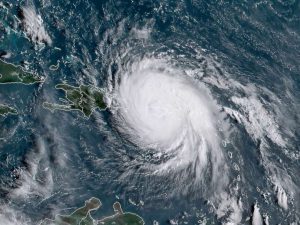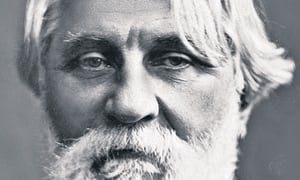
Though tropical cyclones can also gain strength over land, we have seen and experienced elections decided at the outer bounds of rationality, not to mention national borders. And the same goes for scandals. When the two are one and the same, we reach a distinct crossing over into all manner of non-metaphorical winds, downed trees, powerlessness, looting even.
Still it’s important to realize that the fundamental strength of the storm comes from good old warm water in open ocean, just as the current, inspired presidenting comes from heartland voters and good christians everywhere. Sure, climate change and the Russians probably had something to do with the current disasters. But really they were only helping fuel the storm.
“Men of sighs” and “of tears”
 Since everything seems to be All Russia, All the Time, I’ve been thinking about Konstantin Levin, the most interesting character from Anna Karenina, and relatedly D.H. Lawrence, who did not care much for what Tolstoy was saying with Levin. But for some other probably suspicious reason was led back to Turgenev and Knock Knock Knock:
Since everything seems to be All Russia, All the Time, I’ve been thinking about Konstantin Levin, the most interesting character from Anna Karenina, and relatedly D.H. Lawrence, who did not care much for what Tolstoy was saying with Levin. But for some other probably suspicious reason was led back to Turgenev and Knock Knock Knock:
Two incidents that marked the first steps in his career did a great
deal to strengthen his “fatal” reputation. On the very first day after
receiving his commission–about the middle of March–he was walking
with other newly promoted officers in full dress uniform along the
embankment. The spring had come early that year, the Neva was melting;
the bigger blocks of ice had gone but the whole river was choked up
with a dense mass of thawing icicles. The young men were talking and
laughing … suddenly one of them stopped: he saw a little dog some
twenty paces from the bank on the slowly moving surface of the river.
Perched on a projecting piece of ice it was whining and trembling all
over. “It will be drowned,” said the officer through his teeth. The
dog was slowly being carried past one of the sloping gangways that led
down to the river. All at once Tyeglev without saying a word ran down
this gangway and over the thin ice, sinking in and leaping out again,
reached the dog, seized it by the scruff of the neck and getting
safely back to the bank, put it down on the pavement. The danger to
which Tyeglev had exposed himself was so great, his action was so
unexpected, that his companions were dumbfoundered–and only spoke all
at once, when he had called a cab to drive home: his uniform was wet
all over. In response to their exclamations, Tyeglev replied coolly
that there was no escaping one’s destiny–and told the cabman to drive
on.“You might at least take the dog with you as a souvenir,” cried one of
the officers. But Tyeglev merely waved his hand, and his comrades
looked at each other in silent amazement.The second incident occurred a few days later, at a card party at the
battery commander’s. Tyeglev sat in the corner and took no part in the
play. “Oh, if only I had a grandmother to tell me beforehand what
cards will win, as in Pushkin’s _Queen of Spades_,” cried a
lieutenant whose losses had nearly reached three thousand. Tyeglev
approached the table in silence, took up a pack, cut it, and saying
“the six of diamonds,” turned the pack up: the six of diamonds was the
bottom card. “The ace of clubs!” he said and cut again: the bottom
card turned out to be the ace of clubs. “The king of diamonds!” he
said for the third time in an angry whisper through his clenched
teeth–and he was right the third time, too … and he suddenly turned
crimson. He probably had not expected it himself. “A capital trick! Do
it again,” observed the commanding officer of the battery. “I don’t go
in for tricks,” Tyeglev answered drily and walked into the other room.
How it happened that he guessed the card right, I can’t pretend to
explain: but I saw it with my own eyes. Many of the players present
tried to do the same–and not one of them succeeded: one or two did
guess _one_ card but never two in succession. And Tyeglev had
guessed three! This incident strengthened still further his reputation
as a mysterious, fatal character. It has often occurred to me since
that if he had not succeeded in the trick with the cards, there is no
knowing what turn it would have taken and how he would have looked at
himself; but this unexpected success clinched the matter.
Honi soit, as Lev wrote.
Making Light
Jean Cocteau said, “Film will only become art when it’s materials are as inexpensive as pencil and paper.”
Well, at least we know what direction we’re going.
As I’ve been recently reading about taste, and thinking about plays… here’s part of Andrey Tarkovsky’s journal from 1970:
Playwrights often overdo the clever line or turn as the curtain’s about to fall. It shows lack of taste, You don’t find it in good plays.
The strange thing is that when people come together in a community for the purpose, simply, of production, or for reasons of geography, they start to hate each other and do one another down. Because each one only loves himself. Community is an illusion, as a result of which sooner or later there will rise over the contoinents evil, deadly, mushroom clouds.
An agglomeration of people aiming at one thing – filling their stomachs – is doomed to destruction, decay, hostility.
‘Not by bread alone.’
Man is made up of opposing characteristics. History demonstrates vividly the fact that it always moves in the worst possible direction. Either man is not capable directing history, or else he does direct it, but by pushing it down the most terrible, wrong path there is.
There is not a single example to prove the opposite. People are not capable of governing others. They are only capable of destroying. And materialism – naked and cynical – is going to complete the destruction.
Despite the fact that god lives in every soul, that every soul has the capacity to accumulate what is eternal and good, as a mass people can do nothing but destroy. For they have come together not in the name of an ideal, but simply for the sake of a material notion.
Mankind has hurried to protect the body (perhaps on the strength of that natural and unconscious gesture which served as the beginning what is called progress) and has given no thought to protecting the soul.
And here, from January 12, 1972:
Yesterday Sizov dictated comments and criticisms of Solaris collected from various bodies – the cultural department of the Central Committee and the governing board.
I have mad a note of some thirty-three observations. Here they are. There are a great many of them, and if I were to comply with them (which is not actually possible) the whole basis of the film would be destroyed. In other words, it’s even more absurd than it was with Rublyov.
The comments go like this:
1. There ought to be a clearer image of the earth of the future. The film doesn’t make it clear what it’s going to be like (the future, that is).
2. There ought to be some landscapes of the planet of the future.
3. What form of society was the starting-point for Kelvin’s flight – Socialism, Communism or Capitalism?
4. Snaut ought not to speak of the inexpediency (?!) of studying space. It leads to a dead-end situation.
5. Cut out the concept of God. (?!)
6. The encephalograph ought to be run to the end.
7. Cut out the concept of Christianity. (?!)
8. The Conference: cut out the foreign executives.
9. The Finale.
